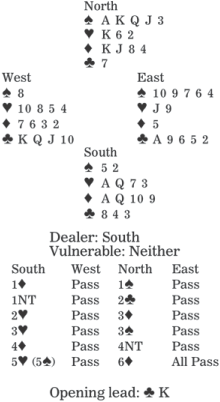Marcus Tullius Cicero, a Roman statesman, lawyer and orator who died in 43 B.C., said, "It is a shameful thing to be weary of inquiry when what we search for is excellent."
We have various inquiry bids, the best-known being Blackwood and Stayman. Also useful is New Minor Forcing. If the auction starts one of a minor - one of a major - one no-trump, responder's rebid of two of the unbid minor promises at least game-invitational values and asks opener to describe his hand further. Opener's priority is to indicate three-card support for responder's major. Without that, he shows four cards in the unbid major, or usually continues with two diamonds or two no-trump.
In this deal, South answers two clubs with two hearts, showing a doubleton spade and four hearts. When North supports diamonds, which is game-forcing (no stopping on dimes), South, without a club stopper or honor-doubleton in spades, continues with three hearts. North now knows that his singleton club is excellent. It is effectively a 34-point deck (10 points in each of three suits and 4 for the club ace). To make a small slam, you typically need 33 out of 40 points; using this ratio gives 28 out of 34. So, North uses (Roman Key Card) Blackwood and puts South into six diamonds.
West leads the club king, then shifts to his spade to dummy's ace. How should South continue?
Declarer should play a trump to his hand, ruff a club high on the board, draw trumps, and claim. He takes four spades, three hearts, four diamonds and the club ruff.


























 Raymond Zhou:
Raymond Zhou: Pauline D Loh:
Pauline D Loh: Hot Pot
Hot Pot Eco China
Eco China China Dream
China Dream China Face
China Face






